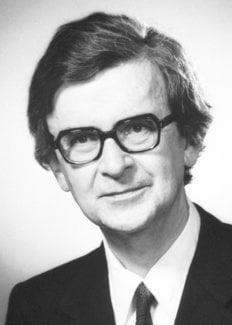Niels K. Jerne
Biographical

Niels K. Jerne, born 23rd December 1911, London
My parents, Hans Jessen Jerne and Else Marie Lindberg, and their ancestors (back to the seventeenth century and earlier) all lived on the island Fanø and in a small adjacent area of western Jutland in Denmark. My family moved to London in 1910, and then to Holland during the first world war. I received my Baccalaureate in Rotterdam in 1928.
After two years of studying physics at the University of Leiden, I switched to medicine at the University of Copenhagen where I presented my thesis on the avidity of antibodies in 1951.
My wife Alexandra and I married in 1964, and now live in our house near Avignon. Further details of my curriculum vitae:
| Research worker at the Danish State Serum Institute (1943-1956) |
| Research fellow at the California Institute of Technology, Pasadena (1954-1955) |
| Head of the Sections of Biological Standards and of Immunology at the World Health Organization, Geneva (1956-1962) |
| Professor of Biophysics at the University of Geneva (1960 – 1962) |
| Professor of Microbiology and Chairman of the Department, University of Pittsburgh (1962-1966) |
| Professor of Experimental Therapy at the Johann-Wolfgang-Goethe-Universität, Frankfurt, and Director of the Paul-Ehrlich-Institut, Frankfurt (1966-1969) |
| Director of the Basel Institute for Immunology, Basel (1969-1980) |
| Special Immunology Adviser to the Director of the Institut Pasteur, Paris (1981-1982) |
| Member emeritus and Honorary Chairman of the Advisory Board of the Basel Institute for Immunology (from 1981) |
| Member of the WHO Advisory Committee on Medical Research (1949-1968) |
| Member of the Advisory Committee on Medical Research of the Panamerican Health Organization (1963-1966) |
| Member of the Expert Advisory Panel of Immunology of the WHO since 1962 |
| Honorary Member of the Robert-Koch-Institut, Berlin (1966) |
| Foreign Honorary Member of the American Academy of Arts and Sciences (1967) |
| Member of the Royal Danish Academy of Sciences (1969) |
| Chairman, Council of the European Molecular Biology Organization (1971-1975) |
| Gairdner Foundation International Award, Toronto (1970) |
| Doctor of Science, h.c., University of Chicago (1972) |
| Honorary Member of the American Association of Immunologists (1973) |
| Foreign Associate of the National Academy of Sciences (USA) (1975) |
| Waterford Bio-Medical Science Award, La Jolla (1978) |
| Doctor of Science, h.c., Columbia University, New York (1978) |
| Foreign Member of the American Philosophical Society (1979) |
| Doctor of Science, h.c., University of Copenhagen (1979) |
| Marcel Benoist Prize, Bern (1979) |
| Fellow of the Royal Society (1980) |
| Doctor of Science, h.c., University of Basel (1981) |
| Member of the Académie des Sciences de l’Institut de France (1981) |
| Paul Ehrlich Prize, Frankfurt (1982) |
| Honorary Member of the British Society for Immunology (1983) |
| Doctor of Medicine, h.c., Erasmus University, Rotterdam (1983) |
| The work referred to in the citation for the award of the Nobel Prize is mainly included in the following papers: |
| “The natural selection theory of antibody formation” Proc. Nat. Acad. Sci. USA 41, 849-857, 1955 |
| “Immunological speculations” Ann. Rev. Microbiol. 14, 341-358, 1960 |
| “Plaque formation in agar by single antibody-producing cells” (with Albert A. Nordin), Science 140, 405, 1963 |
| “The natural selection theory of antibody formation: ten years later” in “Phage and the origins of molecular biology” Cold Spring Harbor Lab. of Quant. Biology 301-312, 1966 |
| “Antibodies and learning” in “The Nerurosciences”, The Rockefeller University Press 200-205, 1967 |
| “Waiting for the End” Cold Spring Harbor Symp. on Quant. Biology 32, 591-603, 1967 |
| “The somatic generation of immune recognition” Eur. J. Immunol. 1, 1-9, 1971 |
| “What precedes clonal selection?” in “The ontogeny of Acquired Immunity”, Ciba Foundation Symposium, Elsevier, Amsterdam 1-15, 1972 |
| “Towards a network theory of the immune system” Ann. Immunol. (Inst. Pasteur) 125C, 373-389, 1974 |
| “The immune system: a web of v-domains” Academic Press, New York, Harvey Lectures 70, 93-110, 1976 |
| “Idiotypic networks and other preconceived ideas”, Immunological Reviews 79, 5-24, 1984 |
This autobiography/biography was written at the time of the award and later published in the book series Les Prix Nobel/ Nobel Lectures/The Nobel Prizes. The information is sometimes updated with an addendum submitted by the Laureate.
Niels K. Jerne died on October 7, 1994.
Nobel Prizes and laureates
Six prizes were awarded for achievements that have conferred the greatest benefit to humankind. The 12 laureates' work and discoveries range from proteins' structures and machine learning to fighting for a world free of nuclear weapons.
See them all presented here.
